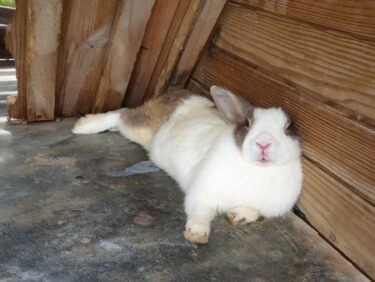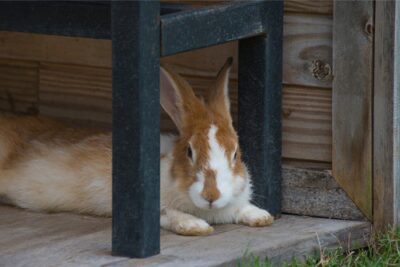Shaking can sometimes be a sign of epilepsy, stroke, or even death in humans. So, when a rabbit starts to shake, we start to become concerned about undiagnosed health problems.
It’s normal for rabbits to tremble occasionally, especially during sleep. Also, rabbits ripple their fur when they are excited. However, if a rabbit lays down and shakes, this is often a sign of illness. Parasites, heatstroke, ear infections, or food poisoning could be to blame.
“Shaking” can refer to trembling, skin rippling, twitching, and convulsing. We’ll explore the different types of shaking in rabbits and what they mean.
Is It Normal for Rabbits to Shake?
Shaking is quite a broad term that encompasses lots of different behaviors. Some types of shaking can be considered “normal,” whereas others are more concerning. There are at least 4 types of shaking that can be seen in rabbits. These include:
| Trembling: | This is a gentle, quivering motion that’s like a vibration. |
| Skin/Fur Rippling: | The fur moves in a wave-like motion, so the body may jolt. |
| Twitching: | Short, jerking movements. This often happens when a rabbit is laying down on the side of the body. |
| Convulsions or Fits: | Violent and irregular contractions of the muscles. |
Convulsions are never considered normal. Skin rippling, on the other hand, is considered very normal in rabbits.
Trembling and twitching can be both normal and abnormal, depending on whether there are any additional symptoms. For example, heatstroke causes trembling, but it also causes drooling and extreme lethargy. But trembling can be considered a sign of contentment in other contexts.
How to Know if Rabbit Shaking Is Normal
Shaking is not always a cause for concern. It can be considered normal in the following scenarios:
- During Sleep – When rabbits sleep deeply, they may shake or tremble. They’ll make a faint clucking sound. So, if your rabbit is lying on its side and shaking gently, this could be the reason. Some rabbits sleep with their eyes open, so you may not realize they are snoozing.
- Pleasure or Gratitude – Rabbits shudder and ripple their skin when they are delighted. You’ll often notice this after your rabbit has been outside or after you’ve fed them a special treat.
- Displeasure – Angry rabbits often twitch their heads or tremble. This is normal If the behavior doesn’t last too long. You’ll know your rabbit is annoyed because it’ll also thump its hind feet.
- Hiccupping – Rabbits, especially babies, get the hiccups from time-to-time. These can cause the rabbit to shake or tremble, and they can last for several minutes. Hiccups are normal unless they happen daily.
- Recovering from a Fright– Rabbits shake when startled. However, the shaking should ease off after a couple of minutes.
So, shaking isn’t necessarily a cause for concern. For the shaking to be considered “normal,” you should be able to identify a reason for it.
Diseases that Cause Rabbits to Shake
If your rabbit starts shaking very often, or the shakes become very aggressive, this suggests there is an underlying illness. The following diseases can cause rabbits to shake and convulse:
- Overheating and heatstroke
- Eating or sniffing something poisonous
- Parasite infections, especially E. Cuniculi and Ear Mites
- Bacterial infections
- Strokes
- Gastrointestinal stasis
- End of life approaching, such as muscle tremors
These diseases tend to create additional symptoms besides just shaking. That’s how you can tell if the shaking is serious or not.

Legitimate Concerns About Rabbit Shaking
If you are concerned, see if you can identify the following symptoms:
- Teeth grinding
- Grunting (continual)
- Avoiding all touch
- Bloated tummy
- Ears flattened to the rabbit’s head
- Cold ears
- Refusing food and drink
- Toppling over / clumsiness
- Breathing heavily – more than 60 breaths per minute
When combined with shaking, these symptoms indicate a medical emergency. So, if your rabbit is behaving in this way, you must act fast. You will need the help of a vet to investigate why your rabbit is shaking.
Heatstroke and Rabbit Trembling
When rabbits overheat, they start to tremble. Rabbits are more susceptible to heatstroke than cats or dogs, so must be kept cool.
Once the temperature reaches about 80 degrees Fahrenheit (26 degrees Celsius), heatstroke is more likely to occur. Rabbits can be affected on cooler days, too. For example, if bunnies are moved from a cool to warm environment too quickly, the results could be dire. In addition to trembling, rabbits with heatstroke tend to:
- Have a raised heart rate (more than 220 beats per minute)
- Drool
- Lay down and become very tired all of a sudden
- Fit or convulse
A rapid heart rate is a clear symptom of heatstroke, especially when it is combined with trembling. So, this combination should never be ignored.
If you see the signs of heatstroke, call your vet right away. In the meantime, you can cool your rabbit by placing it near a fan, blotting its fur with a damp, cool towel, and encouraging it to drink water. Never pour cold water over an overheated rabbit as this can cause shock and heart attacks.
Has My Rabbit Eaten Something Toxic?
There are lots of foods and plants that are poisonous to rabbits. If a rabbit does eat something toxic, the initial symptoms are clumsiness and disorientation. Then, the rabbit lays down and starts to shake. Additional symptoms include:
- Squirming
- Diarrhea
- Panting
- A high temperature
If your rabbit has eaten something toxic, like rhubarb, the shaking may lead to seizures and death if not treated immediately.
And it’s not just food that can cause this severe reaction in rabbits. According to Veterinary Partner, Frontline (a type of flea treatment) can cause severe lethargy, shaking, and seizures in rabbits. So, if your rabbit is laying down and shaking violently, it may have eaten something poisonous.
Parasites and Twitching in Rabbits
Parasitic infections are quite common, and can become life-threatening if not treated. Parasites tend to make rabbits very clumsy, itchy, and dizzy. This is because parasites usually attack the central nervous system (CNS).
The CNS (the brain and the spinal cord) helps with balance, stability, and movement control. So, it’s no surprise that damage to the CNS can cause swaying, twitching, and disorientation.
So, if your rabbit is laying on their side and twitching, it may have a parasitic infection. The most common parasite is E. Cuniculi, which causes a condition called Encephalitozoonosis. Additional symptoms include:
- Tripping
- Dragging Feet
- Swaying
- Torticollis (head tilt)
- Seizures if the disease is not treated
Parasites can be treated with antibiotics and pain relief. Early treatment is vital to prevent irreversible damage to the brain tissue.
Rabbit Shaking Its Head from Side to Side
If your rabbit is shaking its head from side to side, this indicates ear mites or bacterial infection inside the ear.
Ear mites and bacterial ear infections are more common in the English Lop and Dwarf Lop rabbits, but any rabbit can be affected. In addition to head shaking, symptoms include:
- Brown fluid in the ear canal
- Loss of appetite
- Flu-like symptoms (if a bacterial infection)
- Scratching – there may be peeling skin around the ears
So, if shaking is localized to the head, this is probably due to an ear mite infection or bacterial infection.
These conditions can be treated with antibiotics and fluid therapy. Inner ear infections are dangerous because they make it difficult for the rabbit to eat, drink, and stay clean, so they must be treated early.
Can Stroke Cause a Rabbit to Shake?
Trembling is one of the first signs of a stroke in rabbits. Strokes are quite rare, and trembling can be caused by many other conditions, too. Strokes will also cause the following symptoms:
- Nystagmus – side-to-side eye movements
- Paralysis to parts of the body – usually the hind legs
- Instability and dizziness
- Facial weakness – usually on one side
Strokes are becoming more common now that rabbits are living longer, but they are still rare.

Rabbit with GI Stasis Laying Down and Shaking
If a rabbit is laying on its side and twitching, this could be a sign of gastrointestinal stasis (GI) stasis. This is a build-up of gas in the rabbit’s stomach, often caused by eating the wrong foods.
Rabbits with GI stasis tend to lay on their sides to try and relieve their gassy tummy. So, if your rabbit is lying on its side, check if its stomach is bloated. This would be a clear sign of GI stasis.
GI stasis is a severe condition that can cause death if not treated. To prevent it, make sure your rabbit is eating enough fiber (grass hay) and drinking enough water. Rabbits should not be fed processed carbohydrates as this contributes to the problem.
Stress and Twitching in Rabbits
If a rabbit is chronically stressed, it will start to tremble and twitch. According to NI Direct head bobbing and side-swaying are signs of extreme stress. These twitches probably have a self-soothing function.
If your rabbit is chronically stressed, you’d almost certainly see some additional symptoms such as:
- Refusing to be touched
- Sitting and staring for long periods
- Low appetite
- Aggression
- Overgrooming
- Teeth grinding
- Heavy breathing
You should try and resolve whatever is causing your rabbit to become stressed. Rabbits are commonly stressed by:
- Changes in temperature – if the environment becomes too warm
- Proximity to predators (dogs, foxes, coyotes, etc.) – you may need to move your rabbit’s hutch or consider bringing them indoors
- Not enough food and drink – or the wrong types of food and drink. Rabbits need access to clean water at all times, and they can become very stressed if this is not available.
- Overhandling – It has been said that rabbits are an ideal pet for older children rather than younger children. This is because very young children may be tempted to handle their rabbits too often.
- Not enough stimulation – If your rabbit is locked in its cage for long periods of time, this can lead to chronic stress. Most rabbits become immensely happy when they are let outdoors in their run. Rabbits often ripple their skin when they are outdoors.
If your rabbit is overgrooming or self-injuring due to stress, your vet may be able to prescribe a drug that will calm it down. This is only a short-term solution you can try while you improve your rabbit’s environment.
Why Is My Rabbit Laying on Its Side and Shaking?
As mentioned, rabbits sometimes lay on their side if they have GI stasis or they’ve eaten something bad. If that’s the case, there would be signs of bloating, a loss of appetite, and perhaps diarrhea. But lying on their side and shaking is not necessarily a sign of illness.
Rabbits sometimes lay on their sides when they are deeply relaxed. This is called “flopping.” If your rabbit is deeply contented, you may hear a light clucking sound or a gentle vibration.
According to Wabbit Wiki, some people mistake rabbit flopping for illness because it looks as if the rabbit has collapsed. Also, the gentle vibrations are mistaken for muscle twitches and seizures.
If you’re new to owning rabbits, it’s hard to know whether the behavior is normal or not. Shaking is only usually a cause for concern if other symptoms accompany it.
Is Rabbit Shaking a Sign of Death?
As rabbits approach death, some will shake and convulse. These convulsions are automatic muscle contractions. The rabbit probably has very little awareness of these convulsions. Some rabbits also scream just before death. This process of “shutting down” can be very sad to witness.
If death is approaching, the convulsions should not last long. Nothing can be done at this stage to revive the rabbit. But, to reiterate, rabbits shake for all sorts of reasons. Some are serious, but others are perfectly normal.
What’s Normal And Abnormal Shaking in Rabbits?
| Normal Shaking | Abnormal Shaking |
|---|---|
| Trembling after a stressful encounter. This should only last a couple of minutes. | Shaking for long periods of time for no reason |
| If the respiration rate stays within a normal range while the rabbit is trembling, this is a good sign (30 – 60 breaths per minute). | Shaking with a raised respiration rate (more than 60 breaths per minute). |
| Rocking or trembling during sleep, perhaps accompanied by a light clucking sound. | Trembling while awake and for long periods. |
| Skin rippling after a positive experience (i.e. going outdoors). | Convulsing/fits |
| Flopping out and trembling gently. This can be a sign of deep contentment, as long as there are no additional symptoms. | Clumsiness, loss of balance, swishing side to side, falling over, etc. |
| If your rabbit lets you touch it while shaking, this is a positive sign. | Avoids being touched before, during, and after shaking. |
| Shaking the head and stamping the back feet (a sign of annoyance). It should only be temporary. | Shaking the head violently or trying to scratch the head. |
| Hiccupping can make a rabbit tremble. This is normal, especially in young rabbits. | Rabbit lying on its side and shaking with a bloated stomach. |
| Sleeping with eyes open (seemingly staring into space). | Sitting still for very long periods with cold ears or flattened ears. |
If your rabbit is shaking and has other symptoms, see a vet immediately. Convulsions are a medical emergency and shouldn’t be ignored.


my rabbit is like falling over and swishing side to side